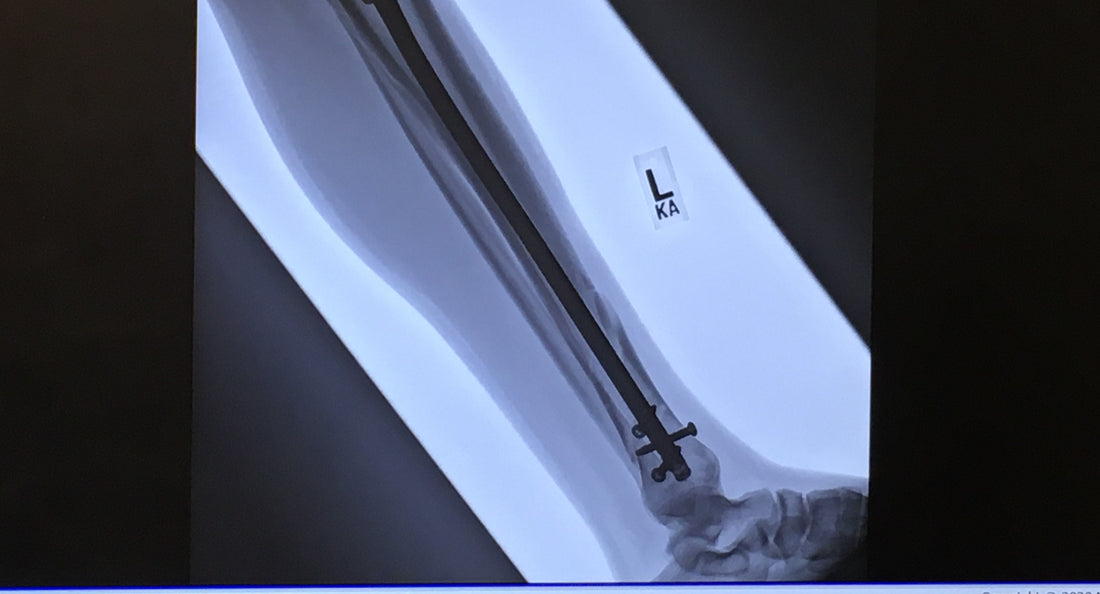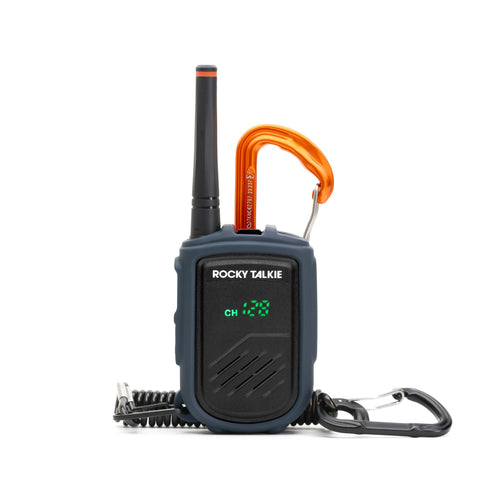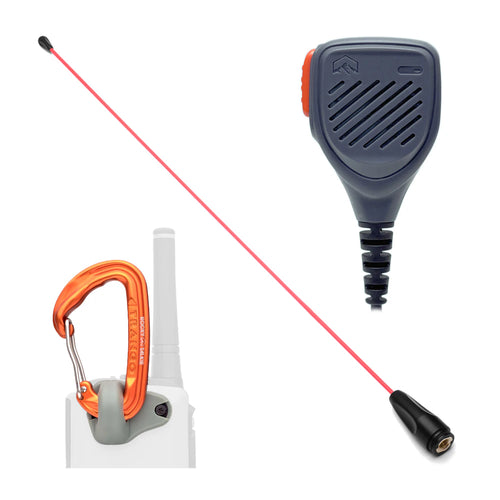
Stranded on a Fourteener with A Spiral Fracture
| 5 min read | 5 CommentsMike Marr had never broken a bone before. But between the sickening pop and the blast of intense pain that shot through his leg as he tumbled head-over skis, it didn’t take prior experience to know what had just happened. He’d broken something. And bad.
The issue? He was at 12,500 feet, above treeline, and even the day’s high temps were well below freezing. And he couldn’t move the leg.
---
It was December 21, 2019, just a few days before Christmas. Earlier that morning, Marr and his partner Laura Slivinski had set out for a tour up 14,433-foot Mt. Elbert, Colorado’s tallest mountain and the second-highest peak in the lower 48. For them, though, it would be a familiar jaunt—both had summited the mountain before and had several years of backcountry skiing experience. And with bluebird skies and no avalanche danger in the forecast, Marr figured not too much could go wrong.

Slivinski heading up the skintrack under bluebird skies. Photo: Mike Marr
A GPS track guided the pair through pine forest as the sun climbed. By the time they’d broken treeline and emerged onto Elbert’s east shoulder, the morning had bloomed into a gorgeous afternoon—quiet and sunny, not a cloud in sight. But after just a few more minutes of touring, the snow began to peter out.
Around 12,500 feet, Marr and Slivinski stopped at the edge of the snowline to confer. Booting 2,000 vertical feet through the talus seemed tedious—that much they both agreed on. Besides, it was almost noon—not a bad time to turn around and call it a day.
Marr and Slivinski stopped for a few photos, laughing and smiling in the perfect afternoon light, before ripping skins and pointing their tips downhill.

Marr and Slivinski, all smiles at 12,500 feet. Photo: Mike Marr
The snow was skiing fine, and Marr was just starting to get into the rhythm of the turns, carving left, then right, wandering slightly off the main trail in search of better snow. About 500 feet down, he spotted a rock, poking up through the snowpack like a shark’s fin.
He had no way of knowing how big it was before he hit it.
The edge of the rock caught the ski, wrenching it uphill and sideways as Marr’s momentum kept him hurtling past. For a split second, he waited for the ski to release, for his body to tumble free of the hazard. But it didn’t. Instead his binding held his boot in a vice grip, twisting his leg until it gave with a snap.
Slivinski was just downhill of Marr when she heard the scream. She skidded to a stop, listening. But within seconds she knew something bad had happened. She started sidehilling upward as fast as she could. It didn’t take long for her to find Marr, lying in the snow, grimacing in agony. Even after years of knowing him, she’d never seen him in pain like this.

The rugged, alpine terrain surrounding Mt. Elbert. Photo: Andrew Davidoff, via Flickr
Just as they began to discuss what to do, two snowshoers appeared over the crest of the hill. They paused, took stock of Marr’s condition, and put in a call to the local volunteer search and rescue group: Lake County SAR. Slivinski took down the rescue group’s number before the snowshoers continued on.
Lake County SAR was out on a training mission, they said. There would be a delay, but they would be there soon.
---
But over 4.6 miles and 4,000 vertical feet from the trailhead, at high altitude and in winter conditions, Marr and Slivinski weren’t exactly easy to get to. And after about three hours, the sun began to dip behind the mountains. Temperatures plummeted.
Slivinski had covered Marr with a space blanket from her emergency kit, but he was freezing, and moving to stay warm was too painful to attempt. They started to worry.
---
Meanwhile, Lake County SAR volunteers had just gotten out of the field and back to their trucks. As soon as they got the call, they hopped in and made a beeline for Mt. Elbert, planning the mission on the fly as they drove. Originally the volunteers had planned to ski up from the bottom, but now they decided there was no time if they wanted to get to Marr before nightfall: They opted to helicopter in.

The Flight For Life helicopter appearing on the horizon. Photo: Laura Slivinski
Slivinski saw the chopper first. It appeared over the horizon, a tiny dot in the dimming sky. It closed in on them, circled—and vanished from view. For about 20 minutes, there was nothing. Slivinski tried to hold down her panic. Had the helicopter failed to spot them? Had they been abandoned? About 20 more minutes passed.
Then it appeared again, Flight For Life emblazoned across its side. And this time, two rescuers, John and Ryan, dropped down with a brand-new sled. They rushed over to the scene. Slivinski and Marr could barely contain their relief.
There was no way to ease Marr’s ski boot over the broken leg (Marr would later find out that he had a spiral fracture, as well as several sub fractures, inside the boot), so they kept it in place as a splint, piled on blankets and layers, and loaded him onto the sled. From then on out, all Marr could see was the stars.
What Slivinski remembers most about John and Ryan is that they were a calming presence, knowledgeable and professional. One of them, Ryan, worked at the Leadville hospital.
The two volunteers clicked into their skis, turned on their headlamps, and began what became a trickier descent than any of them anticipated.
Navigating in the dark was difficult enough, but the trees were tight and the terrain steep. Every few minutes, John and Ryan stepped out of their skis to stabilize Marr’s weight and weave the sled through narrow openings in the forest. All the while, they remained steady and calm, radioing down to the flat ground beneath, where another team was waiting to carry Marr the final mile back to the trailhead.
Things were moving slowly, but they were moving. Then, the sled broke.

Marr ultimately had to have a metal rod and several pins inserted into the bone. Photo: Mike Marr
New as it was, a handle had popped right off while John and Ryan were passing Marr through tight trees, leaving the rescuers with an even more cumbersome load on already hazardous terrain.
But they took the breakage in stride, rigging a makeshift handle with some rope. Slowly, carefully, they towed Marr the rest of the way to the bottom of the slope. There, two snowmobiles were waiting.
By the time they’d gotten back to the trailhead it was around 8:00 PM. The descent had taken about four hours, and by now Ryan had to run, late to his shift at the hospital. Marr and Slivinski said their goodbyes as they were whisked from the trailhead to the emergency room, where Marr’s boot would be removed and his fracture assessed for surgery.
That night, at the hospital, Marr looked up and did a double-take. There in front of him was Ryan. Cleaned up and in scrubs, but unmistakable. He smiled.
His rescuer was there, with him even now. Ryan had other patients, but still—it was hard not to feel like he was there to see the job through to the end.
5 Responses
Leave a comment (all fields required)
Comments will be approved before showing up.














John Jones
|
Mar 01, 21
Muhammad Tariq
|
Mar 01, 21
John K
|
Mar 01, 21
scott marr
|
Mar 01, 21
Kathi Marr
|
Mar 01, 21